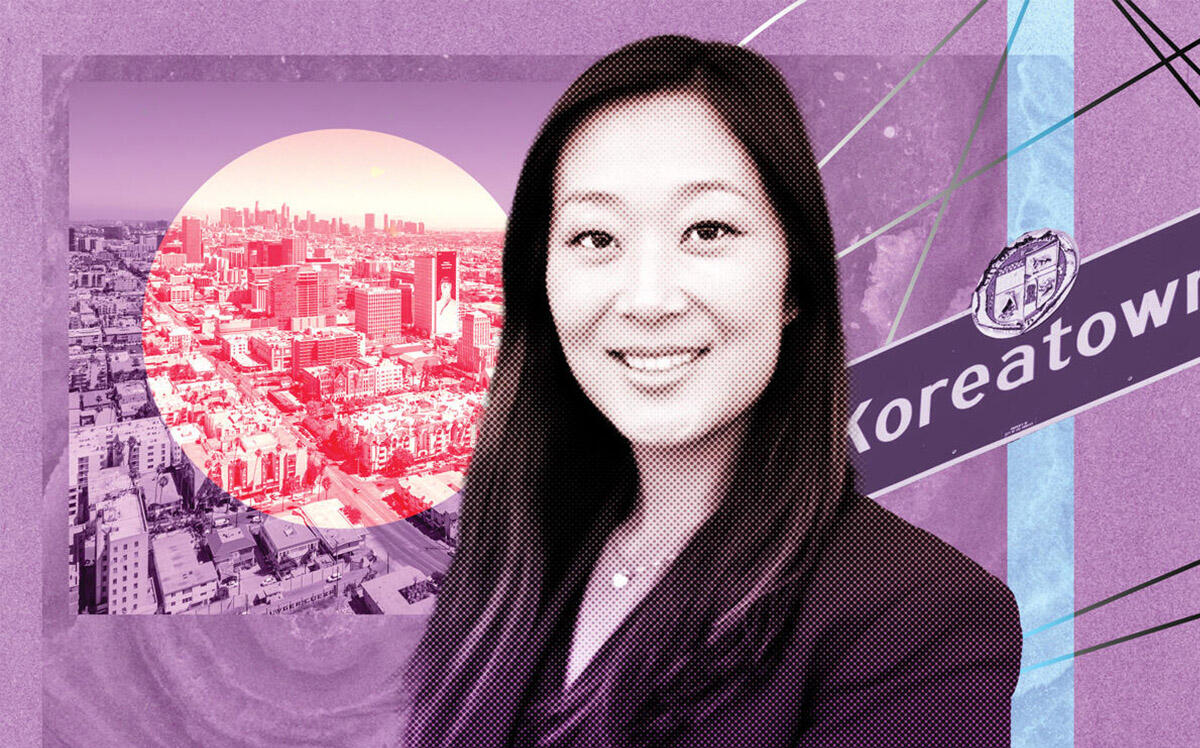Trending
Jaime Lee is not your father’s real estate executive
The heir apparent to Jamison, one of LA's top private landlords, takes a fresh approach to civic engagement

On a December morning in the 25,000-square-foot, fuschia-themed Diamond Ballroom at the Downtown L.A. Marriott, it took Jaime Lee all of 11 minutes to show why she’s a star on the industry panel circuit.
The talk, part of a Bisnow conference honoring female leaders in Southern California commercial real estate, was off to a fine start: One panelist, the founder of an affordable housing nonprofit, called on women in senior positions to be more active as mentors. Another, a development executive, emphasized how her firm was an antidote to the “USC white men’s club.”
Then Lee waded in.
“You asked about the trajectory throughout our careers and how this has changed,” she said. “I think the landscape has changed completely in favor of women over the last 15, 20 years.”
There was still a pay gap, she conceded, and she was still often the only woman in the room.
“But when I started, it was very common for brokers to send me gross text messages in the middle of the night. I didn’t wear dresses. I wore a black suit every day, because somehow I thought that if I dressed sort of [like] a man … I was camouflaging myself or tricking people into thinking like, ‘Oh, maybe this small Asian child is actually a white man.’”
The audience erupted in laughter — Lee had the pacing and deadpan delivery of a seasoned public speaker. But she also had a powerful message: The days of the boys’ club are gone, and companies are actively seeking out talented women.
“And this, you know, bullshit excuse of ‘There aren’t enough of them, there aren’t qualified people,’” she continued. “You’re not looking in the right place. You’re not doing a good enough job.”
Lee — young, female and socially engaged — is not your father’s commercial real estate executive. She is, however, her father’s commercial real estate executive: The elder Lee, an internist-turned-property mogul still known as Dr. David Lee, came to L.A. as a Korean immigrant decades ago and later, under the company name Jamison, astutely bought up dozens of low-priced commercial buildings, slowly but surely creating one of Southern California’s largest real estate empires.
But for years, Jamison has been evolving — the firm is now just as focused on housing production as on commercial leasing — and so has its leadership. Dr. Lee, 67, remains involved as the chair; the company’s top executive roles have for years been divided between three of his four children (the other owns a sandwich shop).
Yet it’s Jaime, the eldest, who has emerged as the primary public face of the company and the obvious successor to her father should the official titles someday shift.
“I think as long as he is involved he will always be the patriarch, and he’s the founder,” Jaime said. “We’ll see what happens.”
It’s also Jaime who has cultivated a lofty profile on top of her real estate career, including prestigious roles on the USC Board of Trustees, the organizing committee for the 2028 Summer Olympics and the Los Angeles Harbor Commission.
“I would view her as one of the upcoming civic leaders in Los Angeles, absolutely,” said former USC President Max Nikias, who resigned from that post amid multiple university scandals shortly after Lee joined the powerful board in 2018.
It’s a simultaneously impressive and unique level of local engagement that would seem to raise questions about Lee’s career arc — whether she’s destined to be a real estate executive, a public servant or something else. Then again, maybe there’s not really any question at all.
“Can’t you be a little bit of everything?” she asked, swatting down the inquiry as quickly as it was posed.
“A major force”
At an outdoor lunch in Central L.A.’s Larchmont Village last month, Lee mostly ignored a Caesar salad as she spoke about everything from sexual harassment in the real estate industry to her Korean-American identity to her family dynamics.
Her father, born into the devastation that followed the Korean War, came to the U.S. as a teenager in the 1970s and got into real estate two decades later, when he started buying cheap property around Koreatown in the aftermath of the L.A. riots.

Along with nearly every large office building in Koreatown, Jamison’s holdings have included the 1.8 million-square-foot California Market Center, the World Trade Center office complex and the shopping center Macy’s Plaza in Downtown L.A. It currently owns around 15 million square feet, likely making it L.A. County’s largest private commercial landlord; before the pandemic, its portfolio was estimated by Real Capital Analytics at $5 billion.
But around a decade ago, the firm undertook “an experiment,” as Jaime Lee put it. The financial crisis had hit the region’s commercial market hard and Jamison, having pivoted to offloading some buildings, also picked up on a trend that would help turn the company into one of the biggest forces shaping L.A.
Years earlier, in 1999, the city had passed its Adaptive Reuse Ordinance, an initiative that made it easier for developers to convert commercial buildings into apartments. When one of its office buildings on Wilshire Boulevard became vacant, Jamison put the money it would have spent on repairs into a residential conversion. Its first apartment project, the 127-unit Westmore, was a hit.
Incentivized by L.A.’s chronic housing shortage and Koreatown’s favorable density zoning, Jamison was soon converting and building apartments all over the neighborhood and beyond. It opened the 35-story Circa, where one-bedroom apartments now go for $3,500 and up, in late 2018, and the 23-story Kurve last August. By the end of the year, the firm will have completed 5,000 units, with thousands more on the way — including a plan to convert the Pierce National Life Building, one of Koreatown’s most recognizable landmarks.
“They’re a major force,” said Sean Burton, CEO of Cityview, an L.A.-based multifamily developer that operates throughout the West.
“We desperately need new housing in Los Angeles,” he added. “I think Jamison can impact that in a significant way.”
Emerging from the shadows
Whereas her father, with his tough business sense, was shaped by his immigrant background, Jaime grew up in the San Fernando Valley, worshiped Kobe Bryant and attended the elite prep school Harvard-Westlake.
But unlike most of her classmates, she was 15 when her career path was determined. By then, Dr. Lee’s property business was flourishing, and he instilled in his daughter what she referred to as a “master plan” — a real estate company run by his children, who would remain closely tethered to both the family and to L.A. (It worked: All four Lee siblings and their families live within blocks of one another and have dinner every Sunday.)
Jaime had other interests — she studied English at USC and considered an MFA in creative writing — but her focus never wavered from the family business. She first worked as an office assistant as a teenager, then moved on to early roles managing capital and properties, including the sprawling California Market Center, which she oversaw while in law school.
“It was definitely getting thrown into the deep end of the pool and seeing how well I could swim,” she said.
Lee was also always hyper-engaged. As an undergraduate, she joined an honor society and a sorority, edited the university magazine and played for the club lacrosse team. Later she became involved with multiple alumni associations, the nonprofit Korean American Coalition, the California Film Commission, Southern California Public Radio, the state’s speech and hearing board. In 2014, she began a four-year term as president of LACERS, the city employees’ pension fund, and four years later was elected to USC’s Board of Trustees, whose other members include Rick Caruso, Ed Roski, Steven Spielberg and Marc Benioff.

Kurve on Wilshire
Within weeks, Lee was appointed by Mayor Eric Garcetti — a personal friend, to whom she once gave a tour of the California Market Center — to the Los Angeles Board of Harbor Commissioners, the body that oversees the massive Port of L.A. Six days later, that commission elected her president.
“I don’t know if she wants to,” said Burton, but “she would make a really good elected official for Los Angeles.” (“I’ll just say no,” Lee said. “Short answer.”)
As the CEO of Jamison Realty, the company’s leasing and brokerage arm, Lee is a tough negotiator but a straight shooter, said Greg Frankovich, a Newmark broker with whom she has negotiated multiple leasing deals.
“I find her to be very transactional, which I think is a good thing,” he said. “You kind of know where you’re going with her and whether or not there’s a deal to be had.”
But as the new face and de facto leader of Jamison, Lee also represents a more modern and public-facing turn for a firm that hasn’t always garnered positive publicity. In its early days, Jamison was known as “a slumlord,” as one L.A. commercial real estate veteran put it — a company that bought and held cheap properties while paying little to no attention to their conditions or tenants.
Dr. Lee, described by his daughter as “old-school,” has generally kept a low public profile, except for a 2018 incident in which he was accused of issuing a violent threat against Koreatown residents who opposed the firm’s development plans for another site on Wilshire Boulevard. (He later apologized and claimed his comments were “misunderstood”; the younger Lee also said his comments were misconstrued.)
Jaime Lee is aware of the company’s past reputation, but resolutely defended its property management: Jamison is a Class B office provider that has never pretended to be anything else, she emphasized, and has the prices to reflect it.
“I think to the extent that there were any knocks on us in that realm, it’s like, well, you’re just judging us on a completely different standard,” she said.
She is also aware of the generational shift she embodies. Whereas her parents were focused on building a business from the ground up and providing for their children, she and her brothers, she said, have the benefit of inheritance.
“We’re not worried about the survival of the company. We’re not worried about making it to the next day,” she said. “And so we have this privilege of being able to say, ‘Well, what do we want it to mean? And what do we want it to be within the community and within Los Angeles, and what do we stand for?’”
Moments later, Lee mentioned leveraging Jamison’s dense residential footprint to create shared amenities such as gyms, parks or even schools. She also mentioned solar panels, and described herself as collaborative. “I’m an elder millennial, but I’m still a millennial,” she said.
It’s a worldview that also helps explain her holistic sense of identity. Lee remembers when, in the early days of social media, her peers were often preoccupied with debates over how much their personal worlds — work, friends, family — should intermingle. And then, years later, how the trend of individual brand cultivation seemed to obviate that debate entirely, leading to a lack of any personal and professional separation.
“And to me,” she continued, “I feel like my identity and who I am and what I do is completely intertwined with me as a real estate executive, with me as a city commissioner, with me as a state commissioner or board member … It’s all one thing. I think they’re just pieces of who I am.”




